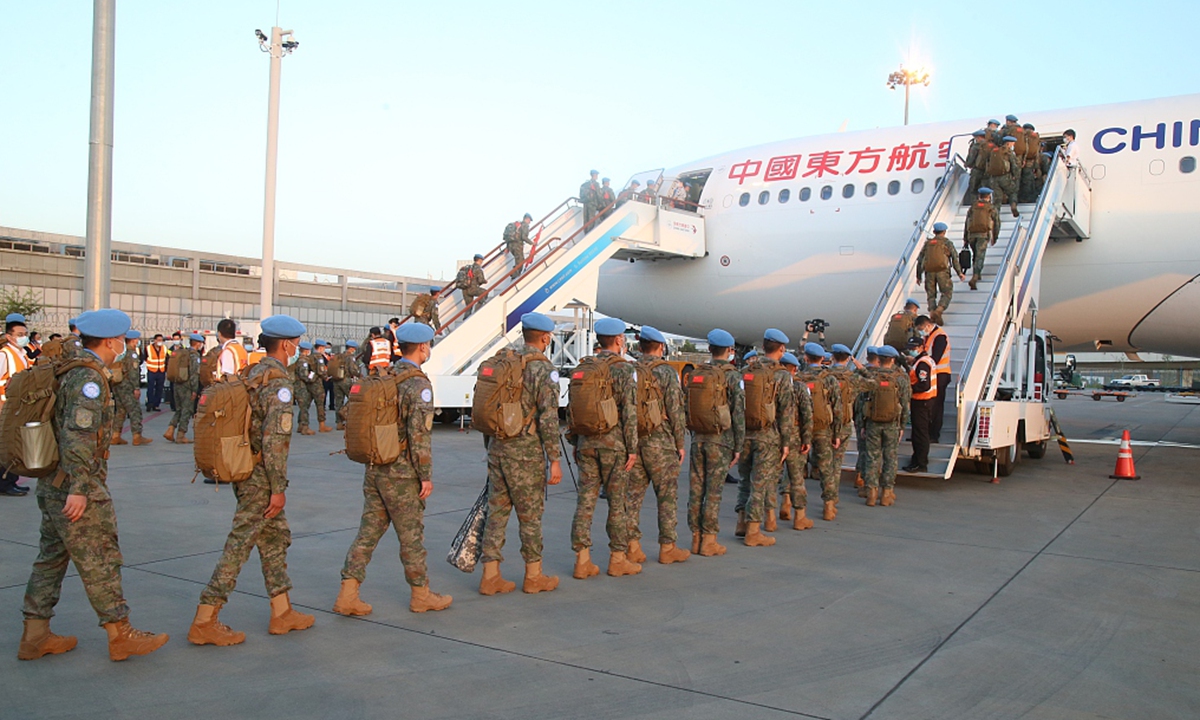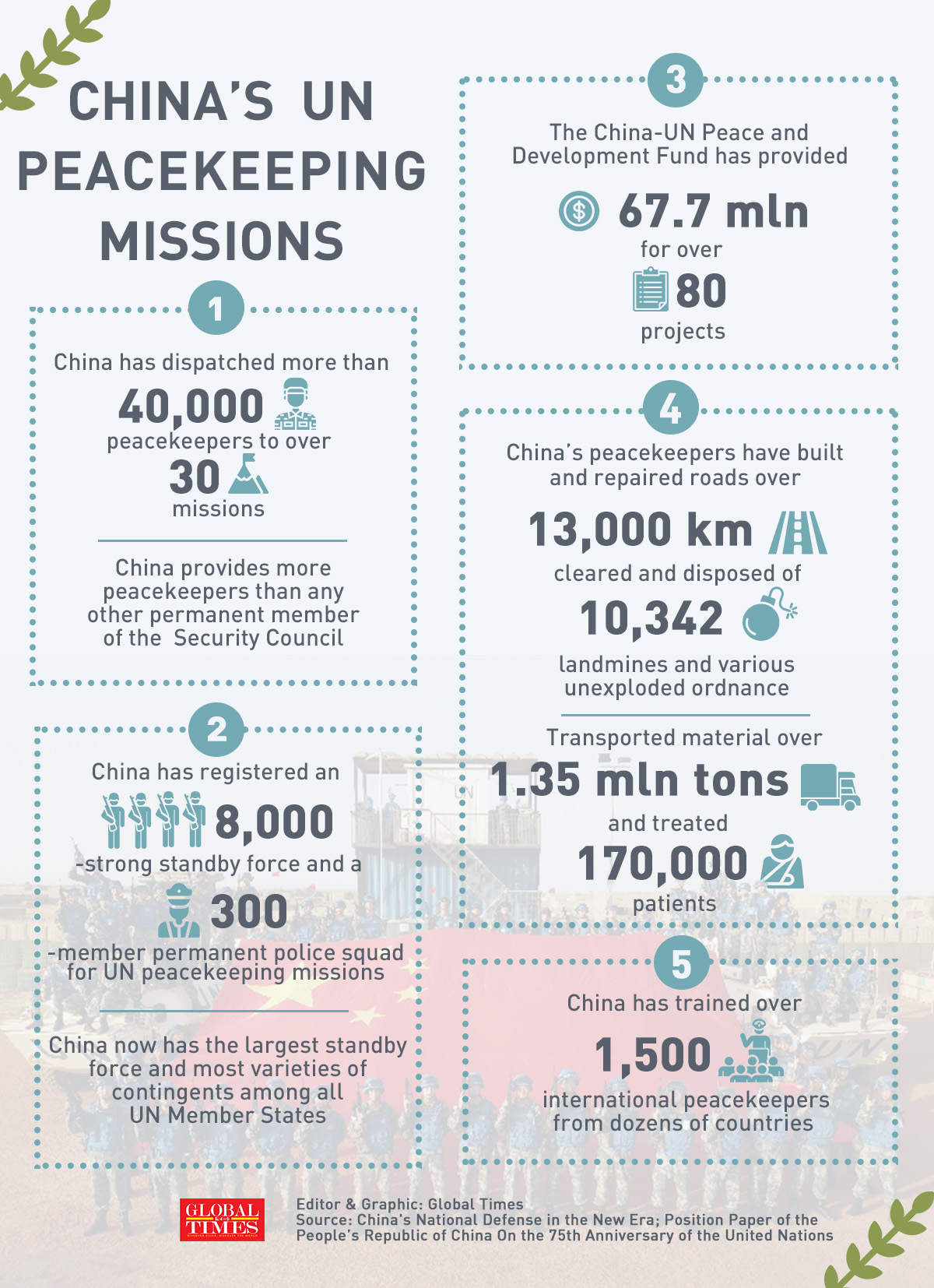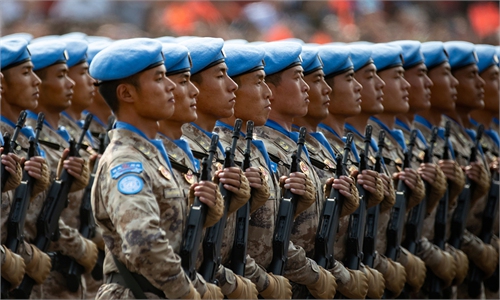Peace is rooted in Chinese DNA: White paper documents China’s 30-year participation in UN peacekeeping operations

Photo: VCG
China on Friday released a white paper on the participation of the country's armed forces in UN peacekeeping operations, commemorating 30 years of China’s contribution to maintaining world peace and stability.
The white paper, released by the State Council Information Office, noted that peace is rooted in the Chinese nation's DNA, and registered the major events of the Chinese military's participation in UN peacekeeping operations.
The appendix to the white paper documents that 16 Chinese soldiers sacrificed their lives during UN peacekeeping operations so far.

China’s UN peacekeeping missions Infographic: GT
The Chinese military's participation in UN peacekeeping operations began in April 1990, when it sent five military observers to the UN Truce Supervision Organization. Over the past 30 years, China has gradually become a “mainstay” in UN peacekeeping operations. In the past 30 years, China has dispatched an accumulative total of more than 40,000 peacekeepers to over 25 UN peacekeeping missions.
The PLA has exchanged and cooperated with more than 90 countries and over 10 international and regional organizations in peacekeeping operations. Through delegation visiting, expert exchanges and joint exercises, the PLA has increased mutual understanding and multilateral relations with other militaries, and enhanced its peacekeeping capacity, says the white paper.
The PLA serves to build a community with a shared future for mankind. China firmly supports and participates in UN peacekeeping operations, making its contribution to building a world of lasting peace, universal security and prosperity, reads the white paper.
The capability of China’s peacekeeping forces has also been consistent. The PLA’s troops have zero violations and have never been repatriated, which is unique among all UN peacekeeping forces, said Cai Hui, senior instructor of Peacekeeping Affairs Center, Ministry of National Defense.
With the deepening of China's participation in UN peacekeeping operations, some Western countries have groundlessly accused that China takes the opportunity to expand its military strength and seek economic interests in host countries. Cai said this narrow understanding is not consistent with the facts.
China’s peacekeeping operations in Africa are authorized by the UN Security Council, and UN peacekeeping operations are not a purely military operation. Peacekeeping includes not only the traditional tasks of isolating conflicts and monitoring ceasefires, but also assisting humanitarian agencies, training government forces and police in host countries, and assisting restoring the rule of law and improving people's livelihoods.
China focuses more on supporting forces. Compared with other major troop-contributing countries, the number of China's security forces is very small. Some countries mainly participate in peacekeeping operations with infantry battalions, and their troop sizes can reach 7,000 or more, Cai said.
Peacekeeping operations are high-risk activities, as they involve possible terrorist attacks, armed conflicts, and riots in host countries. Chinese peacekeepers are able to operate in environments close to battlefields, which has improved the PLA's resilience, said Cai.
China has become the country with the largest number of UN peacekeeping standby forces and the most complete contingents. In the future, more security personnel will be sent to UN peacekeeping operations, according to the white paper.
With the increasing influence of China's participation in UN peacekeeping operations, Chinese peacekeepers have also appeared in more important leadership positions of the UN peacekeeping force.
He Xing is an associate professor at the National University of Defense Technology and a senior instructor at the department of peace missions. He served as commander of the southern theater command of the United Nations Mission in South Sudan (UNMISS) from December 2017 to December 2018, where he was in charge of theater operations.
He believes his rise to the job reflects China's growing influence and the UN’s recognition of Chinese peacekeepers’ dedication. "Over the past 30 years, our peacekeepers have become more adapted to the UN command system and standards, and have a better understanding of various provisions. Their overall capacity has improved.”
In 2020, the COVID-19 pandemic affected the UN peacekeeping mission zones. One of Mali’s first deaths occurred close to the Chinese peacekeeping force camp.
Liu Yong, commander of the seventh batch of the Chinese peacekeeping force in Mali, told the Global Times that all six recommendations they proposed have been adopted by the theater.
During the epidemic, the Chinese peacekeeping troops adopted closed management and other defensive measures, making them the only detachment in the theater whose missions were not interrupted due to the epidemic. The achievements of the Chinese peacekeeping troops in epidemic prevention won widespread recognition.
Liu, who carried out three peacekeeping missions from January 2009 to August 2020, said that the most common evaluation made by foreign peacekeeping teams on China's peacekeeping missions is that they are becoming “more and more professional.”
Meanwhile, peacekeeping opened a window for the PLA to communicate with other countries and changed people’s mind about “China threat” hyped up by Western media.
“They [foreign troops] found that Chinese soldiers are not like what was portrayed. The Chinese soldiers are like ‘old cattle’ who work diligently but don’t talk much. After a period of contact, they found that the Chinese soldiers are not only disciplined but also outstanding in every way,” Cai said.

